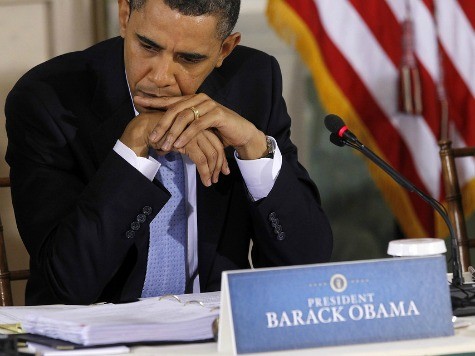As he did in 2011, President Barack Obama is accusing Republicans of “holding the whole country hostage.” This time, the issue is not just the debt ceiling, which comes due in mid-October, but the federal budget, which expires on Sep. 30. In two separate bills last week, House Republicans tied the debt ceiling and the federal budget to postponing and defunding Obamacare, respectively, whose exchanges go online Oct 1.
White House spokesman Jay Carney accused Republicans of threatening to send the country into default or to shut down the government. But Republicans counter that they are doing no such thing–that their bills fully fund every part of the government except Obamacare. It is President Obama, they say, who is threatening default and shutdown, because he believes his party will benefit, as Democrats did in the mid-1990s shutdown.
It is clear that President Obama sees a political benefit in the confrontation, but there is also some truth to the charges of Republican brinkmanship. The House could pass bills defunding Obamacare at any time, or use the ordinary appropriations process to attack the unpopular law. They are using the budget and debt ceiling deadlines because they wish to maximize their leverage and force the president to choose between two evils.
Republicans would counter that charge by pointing out that they have no other choice. The Senate, under Majority Leader Harry Reid, simply ignores legislation passed by the House, including a slew of bills aimed at boosting economic growth. And, in truth, there is nothing to be ashamed of in forcing a fight over Obamacare–not when a majority of the country would rather see a partial shutdown than see the costly law implemented.
It is also clear that President Obama is doing some hostage-taking of his own, quite independent of the battle over Obamacare. For months, the president has said that he will not negotiate over the debt ceiling. In effect, that means he–and not the GOP–is putting the “full faith and credit” of the United States at stake, a point that Jonathan Karl of ABC News finally picked up last week. Refusing to negotiate is threatening to default.
The president hopes–not without reason–that the public will blame the Republicans for any damage to the country’s credit or its economy. That is largely what happened in 2011, when it was the White House that scuttled a “grand bargain” on the federal budget in debt ceiling talks because of an insistence on tax hikes, yet the media and the public blamed the Tea Party for “terrorism,” severely damaging its image and political strength.
Yet the circumstances are different today. The president won his tax hikes–to the extent possible–in the “fiscal cliff” deal at the end of 2012. There is now an expectation that he will lead–and a growing frustration that he has not done so. His loss on gun control, and his poor performance in the Syria crisis, have eroded his public approval. And he has a legacy to consider–does he really want another downgrade, or default, on his watch?
President Obama has a tendency to see his own election and re-election as mandates for sweeping change. Yet Republicans also have a mandate, one that ultimately cannot be dismissed as illegitimate. Both sides, in a sense, are hostage-takers, and Democrats enjoy greater unity. But the public expects the president to govern, not just to fight. In this double standoff, he may be stronger–but not as strong as he or his party imagines.

COMMENTS
Please let us know if you're having issues with commenting.